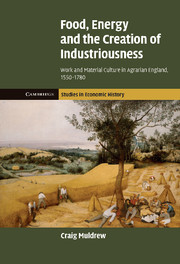 Food, Energy and the Creation of Industriousness
Food, Energy and the Creation of Industriousness Book contents
- Frontmatter
- Contents
- List of figures
- List of tables
- Preface
- Note on measurements and inflation
- List of abbreviations
- 1 Introduction
- 2 What did labourers eat?
- 3 Calories consumed by labourers
- 4 Labourers' household goods
- 5 Work and household earnings
- 6 Agricultural labour and the industrious revolution
- 7 ‘Honest’ and ‘industrious’ labourers?
- Conclusion
- Bibliography
- Index
5 - Work and household earnings
Published online by Cambridge University Press: 04 February 2011
- Frontmatter
- Contents
- List of figures
- List of tables
- Preface
- Note on measurements and inflation
- List of abbreviations
- 1 Introduction
- 2 What did labourers eat?
- 3 Calories consumed by labourers
- 4 Labourers' household goods
- 5 Work and household earnings
- 6 Agricultural labour and the industrious revolution
- 7 ‘Honest’ and ‘industrious’ labourers?
- Conclusion
- Bibliography
- Index
Summary
Memorandum that every one of these [servants] spent me in meat and drinke … one with another another xii l. a piece & a little above. Soe that I judge it were good (in such deare years) to keep as few servantes as a man possibly can, by any meannes convenient. To effect which I know no other meannes, but by putting forth a mans land to tillage, or at a rent, or else keeping them [the servants] at borde wages.
We have seen that labourers had to consume a lot of calories to do their work, and also that English agriculture generally supplied enough food in most years to maintain this consumption. In addition to this, most families managed to increase the value of their household goods as the price of food rose in the early seventeenth century. We now need to consider how labouring families afforded to feed themselves at such levels on the wages labourers were paid, especially when there was such a marked preference for foods which were more expensive per calorie such as wheaten bread, beer and meat. This is especially problematic for the period from 1550 to 1650, when nominal wages lagged significantly behind rising food prices.
As we saw in chapter 1, the most important work on estimating changes in real wages has been done by Phelps Brown and Hopkins and more recently by Gregory Clark.
- Type
- Chapter
- Information
- Food, Energy and the Creation of IndustriousnessWork and Material Culture in Agrarian England, 1550–1780, pp. 208 - 259Publisher: Cambridge University PressPrint publication year: 2011


